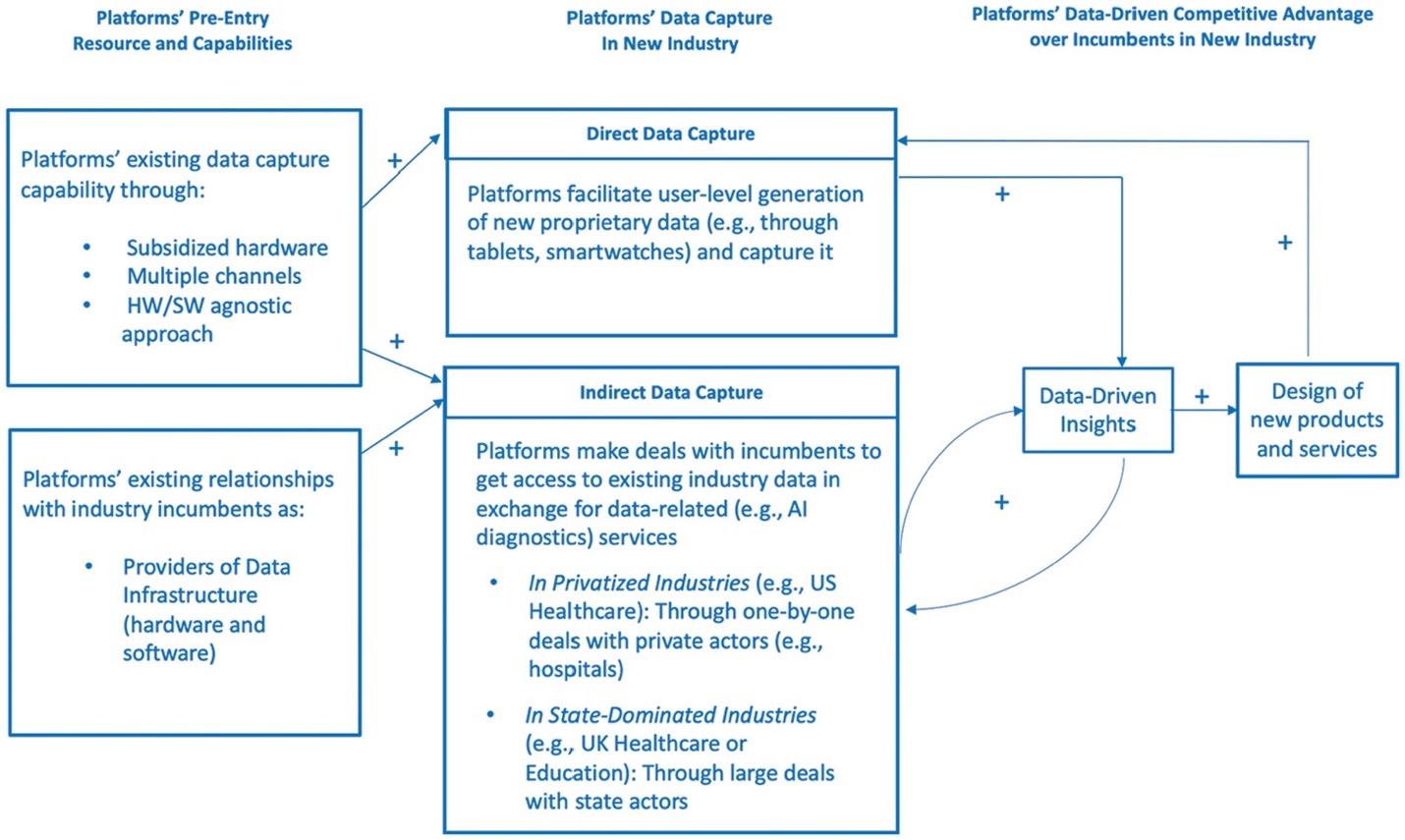How Google and Apple use “digital colonization” to enter highly regulated industries
This blog is written by Hakan Özalp, Pinar Ozcan, and Annabelle Gawer
Big Tech platforms (GAFAM in the Western World: Google/Alphabet, Amazon, Facebook/Meta, Apple, and Microsoft), have risen to become the most influential and largest firms in the world. Their rise through their data-centric approach has been related to increased efficiency and innovations in many areas. However, there are also many concerns related to market power, legacy incumbents, and privacy which are now shaping specific regulations for these firms, as seen in the recent adoption of the Digital Markets Act (DMA) and Digital Services Act (DSA) by the European Parliament, and similar regulations that are upcoming in US, UK, as well as many other countries.

Although these regulations aim to broadly regulate the market power of platforms, there are some industries that are just now experiencing increasingly more activity by these Big Tech platforms and are witnessing initial signs of disruption: These are highly regulated industries such as healthcare and education.
These highly regulated industries are represented by their higher entry barriers, slower-moving nature, considerable state-involvement, and many incumbents protected from competition for a long time. As such, these industries are also associated with large potential for increased efficiency and innovation. This in turn makes the benefits and (potential) harms of Big Tech platforms’ activities critical in these industries since value creation is extremely important (e.g., patient lives saved by new technologies), yet concerns around data privacy, fair competition, and public services that are based on (human) rights are even more salient (e.g., medical or learning records already used by Google and others or “right to education”).
In a recent paper in the California Management Review, we explore how Big Tech platforms enter and compete in highly regulated industries. Our findings highlight that the crux of platform entry into highly regulated industries is access to sensitive data. Big Tech firms rarely aim to directly offer the “primary service” (e.g., providing school education or becoming primary healthcare providers) in these industries, but they rather focus on capturing data as a pathway to other value-adding activities. They do so by engaging two modes of data capture simultaneously: using their own hardware or software to build their own datasets (“direct data capture”, such as the continuous health data collected through an Apple Watch); and forming partnerships with state or private actors (particularly primary service providers) in the industry for access to existing data (“indirect data capture”, such as the UK’s National Health System’s (NHS) partnership with Google’s Deepmind where they provided patient data to Google).

As Big Tech firms combine the data they captured directly and indirectly, they can provide superior data-driven insights, which can add significant value to incumbent service providers (e.g., through saved lives, better learning outcomes, and lower costs). Ultimately, they may design and commercialize new products and services for the highly regulated industry, through which Big Tech platforms can capture value in multiple modes, including leveraging captured data in their other activities (e.g., advertising).
Overall, in highly regulated industries where access to primary service data (e.g., individual-level clinical data or educational records) is a bottleneck due to the sensitivity of this data, those firms that overcome this bottleneck, generally through indirect data capture combined with data-driven insights, gain a unique competitive advantage in the design of new products and services where incumbents (e.g., medical device manufacturers, textbook publishers) have historically operated without such data capture or analysis capabilities. This allows Big Tech platforms to change power dynamics in these highly regulated industries by providing unique added value through data-driven products and services that other industry players increasingly rely on, which in turn commoditizes these players over time.
We name this process (summarized in the figure below) of entry by Big Tech platforms in highly regulated industries “digital colonization”, which we specify as composed of four stages: (1) Provision of data infrastructure services to incumbents; (2) direct and indirect data capture in industry; (3) provision of data-driven insights; and (4) design and commercialization of new products and services.

For platform strategy, we suggest that superior data analytics capabilities that enable the generation of data-driven insights matter even more in highly regulated industries, as they offer a pathway to break the high entry barriers in these industries and solve the bottleneck of data access. We also find that, rather than replacing existing actors and competing head-on to offer primary services, successful platforms add value to the existing value chain in highly regulated industries through data infrastructure services, data-driven insights, and finally new products and services through a multi-stage strategy. Initially, platform managers need to negotiate access to primary service data. At the same time, they need to make efforts to capture novel data through proprietary hardware and software user interfaces. In this context, platform firms may find that subsidizing hardware and access to services can work effectively to “buy their way” into data access. After this initial stage, they can focus on capturing value through a variety of data-related industry activities, such as selling data-driven insights or designing new products and services.
Our findings also highlight the paramount importance of a platform’s policies and special procedures in dealing with the usually sensitive data within highly regulated industries. While taking precautions in the use of sensitive data may seem limiting for value creation (and capture) for a platform, this is necessary, as eventually, a platform’s value for its users is also driven by how well it balances its diverse stakeholders’ interests, especially in terms of data privacy and security, but also in terms of the explainability and fairness of its AI-driven activities.
Another important set of implications is for incumbent firms, who need to respond to Big Tech firms’ uniquely powerful form of competition. We suggest that incumbent firm managers need to formulate their own data capture and analysis strategies and decide quickly whether they will compete or partner with entering platforms. Eventually, incumbent firms need to consider the long-term implications of initially value-creating actions of Big Tech firms, such as providing data driven insights, and whether these will, over time, lead to the commoditization of incumbents’ own activities.
From a regulation and policy point of view, our study highlights that special consideration should be given to regulating access to data and the usage of technology providers in highly regulated industries. This is in line with recent work that suggests platform regulation should consider issues like “sharing (in situ) platform data” and “data mobility/portability” above and beyond a purely market power-based approach that is utilized in the utilities sector. A particular balance needs to be established between giving enough space for platforms to bring their data-driven innovations to various industries and setting clear guidelines as to what data they can access, use, and combine, and what additional responsibilities they must carry while operating in highly regulated industries.
Finally, considering the balance between value creation and capture, we highlight an important dilemma for policymakers and regulators: platforms with more advanced data capture and analysis capabilities can provide more significant added value through better prediction but also these are the very platforms that pose additional privacy and security concerns in a highly regulated industry with sensitive personal data.
To close off, given the dire need of innovation and increasing efficiency of highly regulated industries such as healthcare and education, finding ways to combine the benefits brought by digital platforms with rights, ethics, fairness, and respectful consideration of personal data will become an increasingly important problem to solve in the years to come.
This blog is based on Hakan, Pinar, and Annabelle’s research published in the California Management Review, which is included in the platformpapers references dashboard:
Ozalp, H., Ozcan, P., Dinckol, D., Zachariadis, M., & Gawer, A. (2022). “Digital Colonization” of Highly Regulated Industries: An Analysis of Big Tech Platforms’ Entry into Health Care and Education. California Management Review, OnlineFirst.